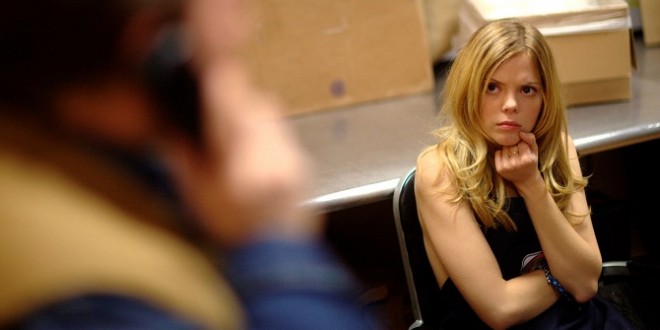Spoiler Scale (How spoilery is this article on a scale of 1 to 10?): 4
Even before the title appears onscreen, we are provided with the familiar descriptor, “Inspired by True Events.” But the letters cover the entire screen, as if writer/director Craig Zobel is exclaiming, “Hey, just remember, I didn’t make this stuff up!” And Zobel is not kidding. The story on the screen is remarkably similar to real events that occurred at a McDonalds in Kentucky in 2004. (In fact, the actual events were even more sordid.) As I watched the film unfold, with Zobel’s rather matter-of-fact approach to the proceedings, I could not help but think of that master of social psychology on celluloid – Michael Haneke (Caché (2005), Funny Games (2007)).
The premise is fairly simple. A caller identifying himself as a police officer convinces a fast-food restaurant manager (Ann Dowd) to interrogate a teenage employee (Dreama Walker) who has allegedly committed a theft (or worse) and keep a close eye on her until the cops are available to investigate. Several characters take turn watching her, as the caller stays on the line to give each watcher instructions on how to assist the police in getting to the bottom of the matter. Bad things happen.
Several reviewers have characterized the film as a dramatization of the infamous Milgrim experiments, which purported to test how far the everyman would go in inflicting pain simply “to follow orders.” But the situation here is more complicated since the victim is not merely a face behind a window – the authority figure is making demands and threats of her. And in my mind, Walker puts in one of the best performances of a young actress this year in alternating between – but not overplaying – the fear, indignation, and revulsion.
Although this was not the case in my theater, there have been a number of reports of viewers walking out. The problem with certain audience members seems not to lie in the graphic nature of the images (which are relatively tame by contemporary standards) but with the very idea of presenting what transpires onscreen (whether it actually happened or not). But being a fan of Haneke, the wanna-be sociologist in me appreciated the boldly familiar setting for this foray into the banality of evil. In movies, these sorts of themes are usually played out for the viewer at a safe distance – either historically (e.g., in Nazi Germany) or contextually (e.g., by war-scarred soldiers doing their duty and trying to stay alive). But this film involves the people who serve you chicken sandwiches in small town America.
That said, Zobel falters a bit when he has to fill in the emotional blanks to this true crime story, and not all of the characters ring true even if they are based on real persons. In panning the film, Joel Morgenstern of the Wall Street Journal observed that it “depicts its working-class characters with almost palpable scorn—everyone is stupid or morally obtuse.” Not only is he wrong in the sense that certain characters do have different reactions to the situation, but I see the opposite problem in terms of the effectiveness of a key performance toward the end of the film. As the story reaches its emotional crescendo, Zobel drops the slow dialogue-driven pacing and makes an abrupt narrative skip with just a couple of implicitly disturbing shots. (The level of subtlety of a rising close-up of a used straw protruding from a soft drink cup will depend on your own disposition.) Prior to this jump, the watcher who is convinced to commit the most reprehensible acts (like all of the other responsible parties) seems to portray his response to the caller’s requests with what can best be described as uncomfortable confusion. It seems to me that people respond to questionable commands from a perceived authority in different ways – some people abide by certain ethical principles absolutely and some people will set those principles aside for “good” reasons; some are simply too daft to think for themselves and choose to supplant their own will with that of others; and finally, others are closeted sadists waiting for the thinnest veil of authority/freedom from external punishment to indulge in their own conscious/subconscious desires. But by attributing the worst of the watchers with this baseline level of innocence, Zobel fails to consider that the latter might exist on the receiving end of that call. From the nature of the acts, I cannot help but believe that there was at least one occupant of that restaurant engaged in behavior more akin to complicity than compliance.
Grade: B




Thanks for the link Steven. Glad to have the opportunity to read your reviews. 🙂
Thanks for coming over, Sandy.